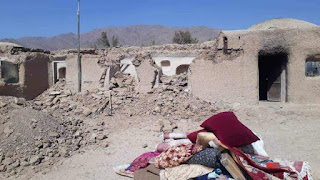Taliban's Discrimination Against Shia Earthquake Victims In Herat
Earthquake in Herat and how Shiite neighborhoods of Herat were deprived of receiving humanitarian aid?
On October 7, 2023 the first of a series of earthquake with a magnitude of 6.3 on the Richter scale occurred in Herat province in western Afghanistan. Earthquakes that killed many people and left extensive destruction. According to United Nations statistics, since then Herat and western Afghanistan have witnessed at least seven earthquakes and numerous aftershocks. On Sunday, October 15, 2021, an earthquake with a magnitude of 6.3 on the Richter scale and four aftershocks once again shook Herat and a number of western provinces of Afghanistan, leaving at least four dead and more than 150 injured in Herat and Badghis provinces. According to the latest statistics provided by the United Nations, 43,000 people have been injured by successive earthquakes in Herat. In this evaluation, the organizations under the United Nations have examined the areas related to Injil, Kushk and Rabat Sangi, Zindajan, Golran, Kouhistan and Herat city.
After these earthquakes, relief efforts began and a wave of humanitarian aid from inside and outside the country flowed towards Herat; However, there are widespread criticisms of the aid distribution process, and a number of residents of this province in the west of the country say that aid to the victims of the earthquake has not been done "fairly".
"Hazara Shiites are not included in the aid list"
In the deadly earthquakes of Herat, the areas where Hazara Shiites live were also seriously damaged and a large number of houses were destroyed in these areas. According to the reports of local sources, the Shiite areas of Herat were most damaged by the 6.3 magnitude earthquake on Sunday, October 15, 2021, which was accompanied by four aftershocks.
Local sources say that this earthquake has caused extensive damage on Shiite areas such as Shahrak Ahmadi, Khobeh Sarbar, Agbar, Jangan, Zarshek, Yaser Shahrak, Khoshroud Shahrak, Azimi Shahrak, Seng Bast, Saadat Shahrak, Shahada Shahrak, Khore Melli, Hossein Abad and Seyed Abad. Local residents say that many houses in these areas have been completely destroyed and many houses have also been seriously damaged.
Hazara Shiites in these areas say that the relief organizations have not paid attention to the damage caused to these areas until now and the people of these areas are struggling with many problems. Baqer Mobalighpour, one of the Hazara activists in Herat, says that "in 63 earthquakes and aftershocks, our areas have also suffered serious damage. We have a complaint that no one considers our grief as their own when they list the damaged areas. When they (government officials) list the affected areas to relief organizations, they do not include even one of the destroyed villages of our people at the end of their list." He added that "in the process of providing aid, the affected areas of the Hazara population of Herat have been marginalized. We expect the domestic and foreign aid organizations not to forget these impoverished and oppressed people."
According to Mr. Mobalighpour, "Most of the Hazara people in Herat are unemployed, and their breadwinners only bring their daily wages and have no savings. In this cold and unsuitable weather, families live in the alleys and streets without any tent or shelter." He added that among Hazara Shiites in Herat, "we know families who don't even have dry bread to eat these days."
"Discrimination and involvement of the Taliban"
Since the beginning of the relief process for the earthquake victims in Herat, there have been concerns about "discriminatory" treatment in the process of distributing aid to the affected people. On the other hand, there were many reports that the Taliban interfered in the process of providing relief to the victims of the earthquake in Herat, and even one of the local media reported that a person affiliated with this group prevented the delivery of relief to a number of victims.
Residents of the Shiite areas of this province say that the damage caused to them in these earthquakes was not investigated and the problems and damages they suffered were not taken into account in the process of distributing aid. They say that there is a possibility that the local people who cooperated with the international organizations in order to prepare the list of the victims of the earthquake, have dealt with "discrimination".
One of the residents of this area told a reporter that "after the first earthquake, Hazara people were the first groups to help the living people, they gave them clothes and food and helped in removing the debris." He added, "Unfortunately, in the subsequent earthquakes when the Hazara areas were damaged and the houses of the Hazaras were destroyed, the people who were responsible for preparing the list and coordinating the distribution of aid did not find any information about these areas."
Residents of the Shiite areas of Herat ask the international aid organizations to send independent teams to assess the damage caused to these areas and to pay serious and urgent attention to the condition of the affected people.
Source: زمین لرزه در هرات





Comments
Post a Comment